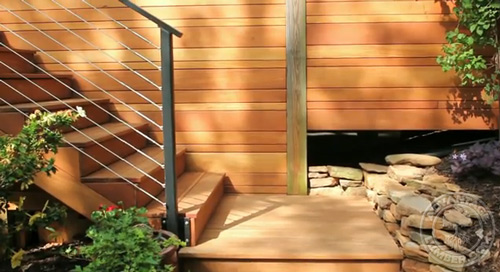
Garapa – (Apuleia Leiocarpa)
Common Name: |
Info coming soon |
Botanical Name: |
Apuleia Leiocarpa |
Indigenous to: |
The variety “molaris” is found in the Amazonian forest, mainly in flooded areas. The main species, Apuleia leiocarpa is found mainly in the South of Brazil, in the Atlantic coast forests, easily colonizing cleared areas. |
Modulus of Rupture: |
18,530 lbf/in2 (127.8 MPa) |
Shrinkage: |
Radial: 4.2%, Tangential: 7.5%, Volumetric: 11.4%, T/R Ratio: 1.8 |
How is it dried: |
kiln-dried (KD) |
Is it dried quickly: |
No should be dried slowly |
Stability: |
Moderately Stable to Stable |
Exterior Wood Recommendation: |
Use class ensured by natural durability: class 2 – inside or under cover (dampness possible)
Species covering the use class 5: Yes Against dry wood borer attacks:does not require any preservative treatment In case of risk of temporary humidification: requires appropriate preservative treatment In case of risk of permanent humidification: use not recommendedThe natural durability of Grapia is very variable. In some cases, this variability can be observed inside the same piece of wood. This species cannot be used without appropriate preservative treatment for end-uses under use class 3 except for some parts of a work such as windows, less exposed than |
Fastening Method: |
Nailing / screwing: good but pre-drilling is necessary Gluing: Yes |
Ecosystem impact: |
This wood species is not listed in the CITES Appendices or on the IUCN Red List of Threatened Species. |
Toxicity and allergic reactions: |
Although severe reactions are uncommon, Garapa has been reported to occasionally cause skin irritation. |
Odor: |
Nothing discernable |
Products we manufacture using this species: |
decking, flooring, dimensional lumber, E4E, S4S, RS (Rough Sawn), deck tiles, and table slabs |
Other common uses: |
|
Susceptibility to |
|
Dry Wood borers: |
Durable – sapwood demarcated (risk limited to sapwood) |
Fungi: |
Class 3 – moderately durable |
Termites: |
Class M – moderately durable |
Treatability: |
Class 3 – poorly permeable |
Janka Hardness: |
|
More Product Information

